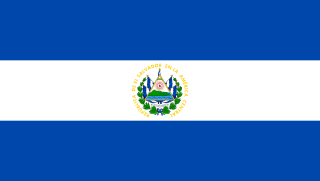
El Salvador, officially the Republic of El Salvador, is a country in Central America. It is bordered on the northeast by Honduras, on the northwest by Guatemala, and on the south by the Pacific Ocean. El Salvador's capital and largest city is San Salvador. The country's population in 2023 was estimated to be 6.5 million.

The 18th Street Gang, also known as Calle 18, Barrio 18, Mara 18, or simply 18 in North America, is a multi-ethnic transnational criminal organization that started as a street gang in Los Angeles. It is one of the largest transnational criminal gangs in Los Angeles, with 30,000-50,000 members between the United States, Mexico, and Central America and is also allied with the Mexican Mafia, another US-based crime organization. A United States Department of Justice report featured the following statement regarding 18th Street and rival gang MS-13, "These two gangs have turned the Central American northern triangle into the area with the highest homicide rate in the world."
A mara is a form of gang originating in the United States, which spread to Central American countries such as El Salvador, Honduras and Guatemala.

The National Civil Police of El Salvador, also known as PNC, is the national civilian police of El Salvador. Although the National Civil Police is not part of the Armed Forces of El Salvador, it constitutes along with them the "Civilian Force". It was created after the Peace Accords were signed at Chapultepec Castle in Mexico City on January 16, 1992, and began the operations on February 1, 1993, in order to guarantee the order, safety, and the public tranquility for every single corner of El Salvador. The PNC is a replacement of the National Police of El Salvador.

Lesbian, gay, bisexual, transgender, intersex, non-binary and otherwise queer, non-cisgender, non-heterosexual citizens of El Salvador face considerable legal and social challenges not experienced by fellow heterosexual, cisgender Salvadorans. While same-sex sexual activity between all genders is legal in the country, same-sex marriage is not recognized; thus, same-sex couples—and households headed by same-sex couples—are not eligible for the same legal benefits provided to heterosexual married couples.

Crime and violence affect the lives of millions of people in Latin America. Some consider social inequality to be a major contributing factor to levels of violence in Latin America, where the state fails to prevent crime and organized crime takes over State control in areas where the State is unable to assist the society such as in impoverished communities. In the years following the transitions from authoritarianism to democracy, crime and violence have become major problems in Latin America. The region experienced more than 2.5 million murders between 2000 and 2017. Several studies indicated the existence of an epidemic in the region; the Pan American Health Organization called violence in Latin America "the social pandemic of the 20th century." Apart from the direct human cost, the rise in crime and violence has imposed significant social costs and has made much more difficult the processes of economic and social development, democratic consolidation and regional integration in the Americas.
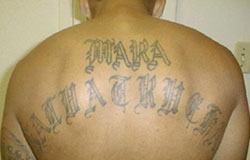
Mara Salvatrucha, commonly known as MS-13, is an international criminal gang that originated in Los Angeles, California, in the 1980s. Originally, the gang was set up to protect Salvadoran immigrants from other gangs in the Los Angeles area. Over time, the gang grew into a more traditional criminal organization. MS-13 has a long time rivalry with the 18th Street gang.

There have been persistent concerns over human rights in El Salvador. Some of these date from the civil war of 1980–92. More recent concerns have been raised by Amnesty International and Human Rights Watch. They include women's rights, child labor, and unlawful killings and harassment of labor union members and other social activists.
Crime in Honduras has become a growing matter of concern for the Honduran population in recent years. Honduras has experienced alarmingly high levels of violence and criminal activity, with homicide rates reaching a peak in 2012, averaging 20 homicides per day. Corruption, extortion, coercion, and drug smuggling also run rampant throughout Honduran society, preventing the nation from building trustworthy authorities like police, and severely limiting economic, social, or political progress. The situation has prompted international organizations and governments to offer assistance in combating crime in Honduras.
Illegal drug trade in El Salvador has included, according to some sources, trans-shipping of cocaine by the Nicaraguan Contras.

Crime in El Salvador has been historically extremely high due to the presence of various gangs. As of 2011, there were an estimated 25,000 gang members at large in El Salvador; with another 43,500 in prison. The best-known gangs, called maras in colloquial Salvadoran Spanish, are Mara Salvatrucha (MS-13) and their rivals 18th Street; maras are hunted by death squads, including Sombra Negra. Newer rivals include the rising mara, The Rebels 13. El Salvador is one of the three countries of the Northern Triangle of Central America, along with neighboring Guatemala and Honduras, which are all afflicted with high levels of violence.
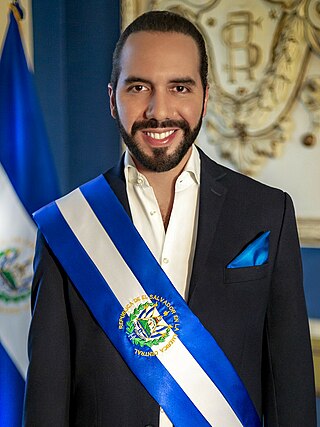
Nayib Armando Bukele Ortez is a Salvadoran politician and businessman who is the 43rd president of El Salvador, serving since 1 June 2019. He is the first Salvadoran president since 1984 who was not elected as a candidate of one of the country's two major political parties: the right-wing Nationalist Republican Alliance (ARENA) and the left-wing Farabundo Martí National Liberation Front (FMLN), of which Bukele was formerly a member.
Crime in Puerto Rico describes acts of violent and non-violent crime that take place within the Commonwealth of Puerto Rico.

The Northern Triangle of Central America (NTCA) is a term used in the United States to refer collectively to the three Central American countries of Guatemala, Honduras, and El Salvador. The term is used with respect to the countries' economic integration, and their shared challenges, including widespread poverty, violence, and corruption, which have prompted many to become refugees fleeing the three nations.
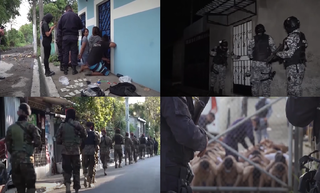
The Salvadoran gang crackdown, referred to in El Salvador as the régimen de excepción and the guerra contra las pandillas, began in March 2022 in response to a crime spike between 25 and 27 March 2022, when 87 people were killed in El Salvador. The Salvadoran government blamed the spike in murders on criminal gangs in the country, resulting in the country's legislature approving a state of emergency that suspended the rights of association and legal counsel, and increased the time spent in detention without charge, among other measures that expanded the powers of law enforcement in the country.

The Terrorism Confinement Center is a maximum security prison located in Tecoluca, San Vicente, El Salvador. The prison was built from July 2022 to January 2023 amidst a large-scale gang crackdown; it was opened in January 2023 by President Nayib Bukele and received its first 2,000 prisoners in February 2023.

From March 2012 to May 2014, the Salvadoran government, the Catholic Church, and the country's two largest criminal gangs, Mara Salvatrucha (MS-13) and the 18th Street gang, came to a truce, known in El Salvador simply as the Gang Truce, to lower the country's rate of homicides and extortions in exchange for improved prison conditions and certain visitation privileges. The truce's principal negotiators were Minister of Public Security David Munguía Payés, former deputy Raúl Mijango, and Bishop Fabio Colindres, and the negotiations were overseen by President Mauricio Funes.
The Territorial Control Plan is an ongoing Salvadoran security and anti-gang program. The program consists of six phases and a potential seventh phase if phases one through six are unsuccessful. In 2019, the Salvadoran government estimated that the Territorial Control Plan would cost US$575.2 million in total.
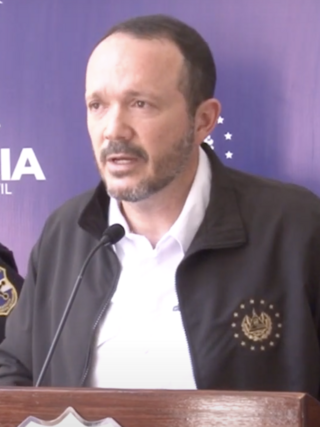
Héctor Gustavo Villatoro Funes is a Salvadoran politician who currently serves as the Minister of Justice and Public Security. He was appointed by President Nayib Bukele in 2021. During Villatoro's term, he has overseen the Salvadoran gang crackdown which has since led to the arrests of over 74,000 alleged gang members as of 7 December 2023.
The blockade of southern Chalatenango began on 24 March 2024 when Salvadoran President Nayib Bukele ordered 5,000 soldiers and 1,000 police officers to blockade and enter the four municipalities in southern Chalatenango. The blockade is the second to be implemented in the Chalatenango Department after the blockade of Nueva Concepción which began in May 2023. The blockade aims to dismantle the 18 Sureños clique of the 18th Street gang.












